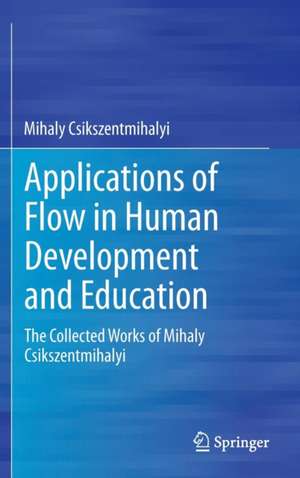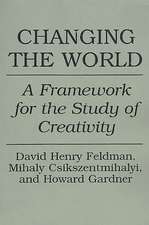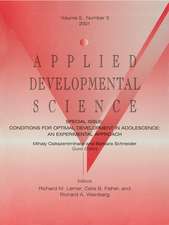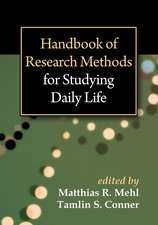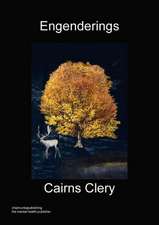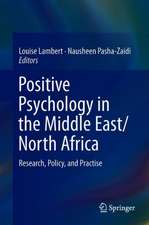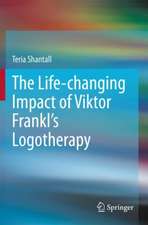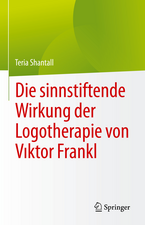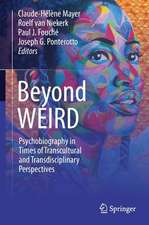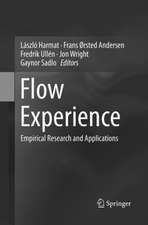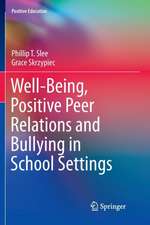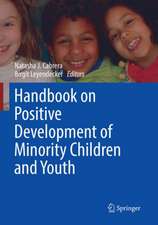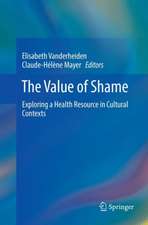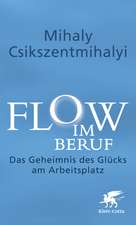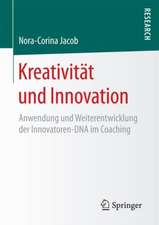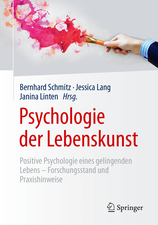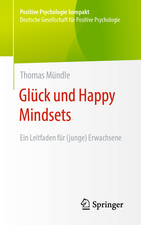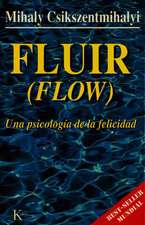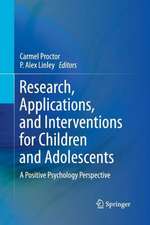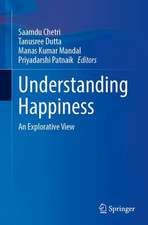Applications of Flow in Human Development and Education: The Collected Works of Mihaly Csikszentmihalyi
Autor Mihaly Csikszentmihalyien Limba Engleză Hardback – 21 aug 2014
This volume brings together a number of articles in which Csikszentmihalyi develops ideas about how to make education and more generally the process of learning to live a good life, more enjoyable. Since theory is the mother of good practice, the first eleven chapters are devoted to theoretical reflections. Some are general and explore what it means to be a human being, what it means to be a person, when we look at life from the perspective of flow. Others are more narrowly focused on such topics as consumption, education, teaching and learning. They help laypeople reflect how they can arrange their lives in such a way as to leave a small ecological footprint while getting the most enjoyment. The second section of the volume contains a dozen empirical articles on similar topics. They deal with the development of identity and self-worth; with the formation of goals and motivation; with loneliness and family life.
| Toate formatele și edițiile | Preț | Express |
|---|---|---|
| Paperback (1) | 707.63 lei 6-8 săpt. | |
| SPRINGER NETHERLANDS – 10 sep 2016 | 707.63 lei 6-8 săpt. | |
| Hardback (1) | 708.57 lei 6-8 săpt. | |
| SPRINGER NETHERLANDS – 21 aug 2014 | 708.57 lei 6-8 săpt. |
Preț: 708.57 lei
Preț vechi: 833.62 lei
-15% Nou
Puncte Express: 1063
Preț estimativ în valută:
135.58€ • 141.56$ • 112.21£
135.58€ • 141.56$ • 112.21£
Carte tipărită la comandă
Livrare economică 05-19 aprilie
Preluare comenzi: 021 569.72.76
Specificații
ISBN-13: 9789401790932
ISBN-10: 9401790930
Pagini: 516
Ilustrații: XXII, 494 p. 31 illus.
Dimensiuni: 155 x 235 x 43 mm
Greutate: 0.9 kg
Ediția:2014
Editura: SPRINGER NETHERLANDS
Colecția Springer
Locul publicării:Dordrecht, Netherlands
ISBN-10: 9401790930
Pagini: 516
Ilustrații: XXII, 494 p. 31 illus.
Dimensiuni: 155 x 235 x 43 mm
Greutate: 0.9 kg
Ediția:2014
Editura: SPRINGER NETHERLANDS
Colecția Springer
Locul publicării:Dordrecht, Netherlands
Public țintă
ResearchCuprins
Introduction.- Part I. Theoretical Contributions.- 1. Does Being Human Matter? One Some Interpretive Problems of Comparative Ludology; Mihaly Csikszentmihalyi.- 2. The Development of the Person: An Experiential Perspective on the Ontogenesis of Psychological Complexity; Mihaly Csikszentmihalyi and Kevin Rathunde.- 3. Life Themes: A Theoretical and Empirical Exploration of their Origins and Effects; Mihaly Csikszentmihalyi and Olga V. Beattie.- 4. The Role of Emotions in the Development of Wisdom; Mihaly Csikszentmihalyi and Jeanne Nakamura.- 5. The Costs and Benefits of Consuming; Mihaly Csikszentmihalyi.- 6. Flow and Education; Mihaly Csikszentmihalyi.- 7. Learning Flow and Happiness; Mihaly Csikszentmihalyi.- 8. Intrinsic Motivation and Effective Teaching: A Flow Analysis; Mihaly Csikszentmihalyi.- 9. The Social Context of Middle School: Teachers, Friends, and Activities in Montessori and Traditional School Environments; Kevin Rathunde and Mihaly Csikszentmihalyi.- 10. Do Students Care about Learning: A Conversation with Mihaly Csikszentmihalyi; Marge Scherer.- 11. Flow: The Joy of Reading; Mihaly Csikszentmihalyi.- Part II. Empirical Studies.- 12. The Ecology of Adolescent Activity and Experience; Mihaly Csikszentmihalyi, Reed Larson and Suzanne Prescott.- 13. Experiential Correlates of Time Alone in Adolescence; Reed Larson and Mihaly Csikszentmihalyi.- 14. Intrinsic Rewards in School Crime; Mihaly Csikszentmihalyi and Reed Larson.- 15. Mood Variability and the Psychosocial Adjustment of Adolescents; Reed Larson, Mihaly Csikszentmihalyi and Ronald Graef.- 16. Affiliation Motivation and Daily Experience: Some Issues on Gender Differences; Maria Mei-ha Wong and Mihaly Csikszentmihalyi.- 17. Relations between Identity in Young Adulthood and Intimacy at Midlife; Stephen Kahn, Gary Zimmerman, Mihaly Csikszentmihalyi and Jacob W. Getzels.- 18. The Quality of Experience of Asian American Adolescents in Activities Related to Future Goals; Kiyoshi Asakawa and Mihaly Csikszentmihalyi.- 19. Adolescent Happiness and Family Interaction; Kevin Rathunde and Mihaly Csikszentmihalyi.- 20. Individual and Situational Factors Related to the Experience of Flow in Adolescence: A Multilevel Approach; Jennifer A. Schmidt, David J. Shernoff and Mihaly Csikszentmihalyi.- 21. A Longitudinal Study of the Self-Concept and Experiential Components of Self-Worth and Affect across Adolescence; Giovanni B. Moneta, Barbara Schneider and Mihaly Csikszentmihalyi.- 22. Motivation and Academic Achievement: The Effects of Personality Traits and the Quality of Experience; Maria Mei-ha Wong and Mihaly Csikszentmihalyi.- 23. The Experience of Leisure in Adolescence; Douglas Kleiber, Reed Larson and Mihaly Csikszentmihalyi.- 24. Student Engagement in High School Classrooms from the Perspective of Flow Theory; David J. Shernoff, Mihaly Csikszentmihalyi, Barbara Schneider and Elisa Steele Shernoff.
Notă biografică
A Hungarian psychology professor, who emigrated to the United States at the age of 22. Now at Claremont Graduate University, he is the former head of the department of psychology at the University of Chicago and of the department of sociology and anthropology at Lake Forest College. He is noted for both his work in the study of happiness and creativity and also for his notoriously difficult name, in terms of pronunciation for non-native speakers of the Hungarian language, but is best known as the architect of the notion of flow and for his years of research and writing on the topic. He is the author of many books and over 120 articles or book chapters. Martin Seligman, former president of the American Psychological Association, described Csikszentmihalyi as the world's leading researcher on positive psychology. Csikszentmihalyi once said "Repression is not the way to virtue. When people restrain themselves out of fear, their lives are by necessity diminished. Only through freely chosen discipline can life be enjoyed and still kept within the bounds of reason." His works are influential and are widely cited.
Textul de pe ultima copertă
The third volume of the collected works of Mihaly Csikszentmihalyi covers his work on the application of flow in areas that go beyond the field of leisure where the concept was first applied. Based on his personal experience with schooling and learning, as well as that of many others, and contrary to what Cicero claimed, Csikszentmihalyi arrived at the conclusion that instead of taking pride in making the roots of knowledge as bitter as possible, we should try to make them sweeter. Just as flow became a popular and useful concept in voluntary activities, it could likewise be applied in education with the end result of young people being more likely to continue learning not just because they have to but because they want to.
This volume brings together a number of articles in which Csikszentmihalyi develops ideas about how to make education, and more generally the process of learning to live a good life, more enjoyable. Since theory is the mother of good practice, the first eleven chapters are devoted to theoretical reflections. Some are general and explore what it means to be a human being, what it means to be a person, when we look at life from the perspective of flow. Others are more narrowly focused on such topics as consumption, education, teaching, and learning. They help laypeople reflect how they can arrange their lives in such a way as to leave a small ecological footprint while getting the most enjoyment. The second section of the volume contains a dozen empirical articles on similar topics. They deal with the development of identity and self-worth; with the formation of goals and motivation; with loneliness and family life.
This volume brings together a number of articles in which Csikszentmihalyi develops ideas about how to make education, and more generally the process of learning to live a good life, more enjoyable. Since theory is the mother of good practice, the first eleven chapters are devoted to theoretical reflections. Some are general and explore what it means to be a human being, what it means to be a person, when we look at life from the perspective of flow. Others are more narrowly focused on such topics as consumption, education, teaching, and learning. They help laypeople reflect how they can arrange their lives in such a way as to leave a small ecological footprint while getting the most enjoyment. The second section of the volume contains a dozen empirical articles on similar topics. They deal with the development of identity and self-worth; with the formation of goals and motivation; with loneliness and family life.
Caracteristici
Demonstrates that schools can indeed provide autotelic experiences Is evidence that flow and positive psychology can influence how young people are being taught Inspires readers to ponder what it means to be alive and really live Clearly shows, in content and tone, the enjoyment that the pursuit of empirical research provides Includes supplementary material: sn.pub/extras
